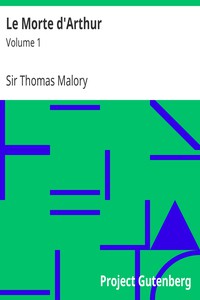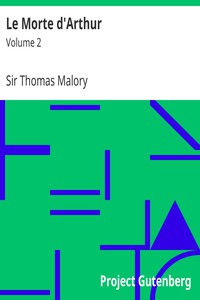Le Morte d'Arthur: Volume 1, Sir Thomas Malory [most inspirational books of all time .txt] 📗

- Author: Sir Thomas Malory
Book online «Le Morte d'Arthur: Volume 1, Sir Thomas Malory [most inspirational books of all time .txt] 📗». Author Sir Thomas Malory
I command, said the Archbishop, that ye keep you within your church and pray unto God still, that no man touch the sword till the high mass be all done. So when all masses were done all the lords went to behold the stone and the sword. And when they saw the scripture some assayed, such as would have been king. But none might stir the sword nor move it. He is not here, said the Archbishop, that shall achieve the sword, but doubt not God will make him known. But this is my counsel, said the Archbishop, that we let purvey ten knights, men of good fame, and they to keep this sword. So it was ordained, and then there was made a cry, that every man should assay that would, for to win the sword. And upon New Year’s Day the barons let make a jousts and a tournament, that all knights that would joust or tourney there might play, and all this was ordained for to keep the lords together and the commons, for the Archbishop trusted that God would make him known that should win the sword.
So upon New Year’s Day, when the service was done, the barons rode unto the field, some to joust and some to tourney, and so it happened that Sir Ector, that had great livelihood about London, rode unto the jousts, and with him rode Sir Kay his son, and young Arthur that was his nourished brother; and Sir Kay was made knight at All Hallowmass afore. So as they rode to the jousts-ward, Sir Kay lost his sword, for he had left it at his father’s lodging, and so he prayed young Arthur for to ride for his sword. I will well, said Arthur, and rode fast after the sword, and when he came home, the lady and all were out to see the jousting. Then was Arthur wroth, and said to himself, I will ride to the churchyard, and take the sword with me that sticketh in the stone, for my brother Sir Kay shall not be without a sword this day. So when he came to the churchyard, Sir Arthur alighted and tied his horse to the stile, and so he went to the tent, and found no knights there, for they were at the jousting. And so he handled the sword by the handles, and lightly and fiercely pulled it out of the stone, and took his horse and rode his way until he came to his brother Sir Kay, and delivered him the sword. And as soon as Sir Kay saw the sword, he wist well it was the sword of the stone, and so he rode to his father Sir Ector, and said: Sir, lo here is the sword of the stone, wherefore I must be king of this land. When Sir Ector beheld the sword, he returned again and came to the church, and there they alighted all three, and went into the church. And anon he made Sir Kay swear upon a book how he came to that sword. Sir, said Sir Kay, by my brother Arthur, for he brought it to me. How gat ye this sword? said Sir Ector to Arthur. Sir, I will tell you. When I came home for my brother’s sword, I found nobody at home to deliver me his sword; and so I thought my brother Sir Kay should not be swordless, and so I came hither eagerly and pulled it out of the stone without any pain. Found ye any knights about this sword? said Sir Ector. Nay, said Arthur. Now, said Sir Ector to Arthur, I understand ye must be king of this land. Wherefore I, said Arthur, and for what cause? Sir, said Ector, for God will have it so; for there should never man have drawn out this sword, but he that shall be rightwise king of this land. Now let me see whether ye can put the sword there as it was, and pull it out again. That is no mastery, said Arthur, and so he put it in the stone; wherewithal Sir Ector assayed to pull out the sword and failed.
How King Arthur pulled out the sword divers times.
Now assay, said Sir Ector unto Sir Kay. And anon he pulled at the sword with all his might; but it would not be. Now shall ye assay, said Sir Ector to Arthur. I will well, said Arthur, and pulled it out easily. And therewithal Sir Ector knelt down to the earth, and Sir Kay. Alas, said Arthur, my own dear father and brother, why kneel ye to me? Nay, nay, my lord Arthur, it is not so; I was never your father nor of your blood, but I wot well ye are of an higher blood than I weened ye were. And then Sir Ector told him all, how he was betaken him for to nourish him, and by whose commandment, and by Merlin’s deliverance.
Then Arthur made great dole when he understood that Sir Ector was not his father. Sir, said Ector unto Arthur, will ye be my good and gracious lord when ye are king? Else were I to blame, said Arthur, for ye are the man in the world that I am most beholden to, and my good lady and mother your wife, that as well as her own hath fostered me and kept. And if ever it be God’s will that I be king as ye say, ye shall desire of me what I may do, and I shall not fail you; God forbid I should fail you Sir, said Sir Ector, I will ask no more of you, but that ye will make my son, your foster brother, Sir Kay, seneschal of all your lands. That shall be done, said Arthur, and more, by the faith of my body, that never man shall have that office but he, while he and I live. Therewithal they went unto the Archbishop, and told him how the sword was achieved, and by whom; and on Twelfth-day all the barons came thither, and to assay to take the sword, who that would assay. But there afore them all, there might none take it out but Arthur; wherefore there were many lords wroth, and said it was great shame unto them all and the realm, to be overgoverned with a boy of no high blood born. And so they fell out at that time that it was put off till Candlemas and then all the barons should meet there again; but always the ten knights were ordained to watch the sword day and night, and so they set a pavilion over the stone and the sword, and five always watched. So at Candlemas many more great lords came thither for to have won the sword, but there might none prevail. And right as Arthur did at Christmas, he did at Candlemas, and pulled out the sword easily, whereof the barons were sore aggrieved and put it off in delay till the high feast of Easter. And as Arthur sped before, so did he at Easter; yet there were some of the great lords had indignation that Arthur should be king, and put it off in a delay till the feast of Pentecost.
Then the Archbishop of Canterbury by Merlin’s providence let purvey then of the best knights that they might get, and such knights as Uther Pendragon loved best and most trusted in his days. And such knights were put about Arthur as Sir Baudwin of Britain, Sir Kay, Sir Ulfius, Sir Brastias. All these, with many other, were always about Arthur, day and night, till the feast of Pentecost.
How King Arthur was crowned, and how he made officers.
And at the feast of Pentecost all manner of men assayed to pull at the sword that would assay; but none might prevail but Arthur, and pulled it out afore all the lords and commons that were there, wherefore all the commons cried at once, We will have Arthur unto our king, we will put him no more in delay, for we all see that it is God’s will that he shall be our king, and who that holdeth against it, we will slay him. And therewithal they kneeled at once, both rich and poor, and cried Arthur mercy because they had delayed him so long, and Arthur forgave them, and took the sword between both his hands, and offered it upon the altar where the Archbishop was, and so was he made knight of the best man that was there. And so anon was the coronation made. And there was he sworn unto his lords and the commons for to be a true king, to stand with true justice from thenceforth the days of this life. Also then he made all lords that held of the crown to come in, and to do service as they ought to do. And many complaints were made unto Sir Arthur of great wrongs that were done since the death of King Uther, of many lands that were bereaved lords, knights, ladies, and gentlemen. Wherefore King Arthur made the lands to be given again unto them that owned them.
When this was done, that the king had stablished all the countries about London, then he let make Sir Kay seneschal of England; and Sir Baudwin of Britain was made constable; and Sir Ulfius was made chamberlain; and Sir Brastias was made warden to wait upon the north from Trent forwards, for it was that time the most party the king’s enemies. But within few years after Arthur won all the north, Scotland, and all that were under their obeissance. Also Wales, a part of it, held against Arthur, but he overcame them all, as he did the remnant, through the noble prowess of himself and his knights of the Round Table.
How King Arthur held in Wales, at a Pentecost, a great feast, and what kings and lords came to his feast.
Then the king removed into Wales, and let cry a great feast that it should be holden at Pentecost after the incoronation of him at the city of Carlion. Unto the feast came King Lot of Lothian and of Orkney, with five hundred knights with him. Also there came to the feast King Uriens of Gore with four hundred knights with him. Also there came to that feast King Nentres of Garlot, with seven hundred knights with him. Also there came to the feast the king of Scotland with six hundred knights with him, and he was but a young man. Also there came to the feast a king that was called the King with the Hundred Knights, but he and his men were passing well beseen at all points. Also there came the king of Carados with five hundred knights. And King Arthur was glad of their coming, for he weened that all the kings and knights had come for great love, and to have done him worship at his feast; wherefore the king made great joy, and sent the kings and knights great presents. But the kings would none receive, but rebuked the messengers shamefully, and said they had no





Comments (0)